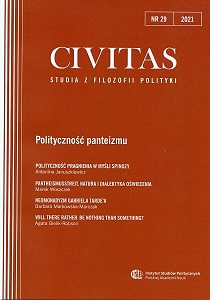Pantheismusstreit, natura i dialektyka oświecenia
Pantheismusstreit, the Nature, and the Dialectic of Enlightenment
Author(s): Marek WoszczekSubject(s): Metaphysics, Ethics / Practical Philosophy, Early Modern Philosophy, 19th Century Philosophy, German Idealism, Philosophy of Religion, Philosophy of Science, Ontology
Published by: Instytut Studiów Politycznych PAN
Keywords: pantheism controversy; Spinoza; naturalistic pantheism; Enlightenment; Romanticism; Max Horkheimer; Theodor Adorno; de-eschatologisation; immanence;
Summary/Abstract: The so-called pantheism controversy was an important philosophical event in the German intellectual landscape in the last two decades of the 18th century, which also provoked the massive Spinoza revival in Germany at that time. There is a vast literature concerning the controversy from both philosophical and purely historiographical point of view, however, despite the widely discussed Enlightenment tetralogy by Jonathan I. Israel, there is still lacking some more comprehensive debate regarding a relation of the Pantheismusstreit to a global dynamics of the late Enlightenment and its internal developmental tensions. I discuss the key ideas formulated by Herder, Goethe, Fichte, Kant, Schleiermacher and Novalis as responses to the pantheistic challenge, and I show that they are closely related in that they make transparent some core ideological tensions typical of the modernity itself. I identify two principal political axes which are centres of gravity in the whole Streit: axis of transcendence/immanence, and axis of autonomy/heteronomy. I claim that the historical ‘pantheism’ phenomenon should not be a priori linked with some emancipatory potential but rather taken as a kind of ‘lens’ or ‘sounding probe’ to study Enlightenment’s internal weak points and neglected problems, which in many cases have been instrumentalized by the anti-Enlightenment current. However, I stress that pantheism as an idea played a quite fundamental role in a rapid process of de-eschatologization, and is, at the same time, a highly significant symptom of political re-orientation within the modernity itself in ways which have nothing to do with the claims of the classical secularization thesis by Löwith, Schmitt or Taubes. I also criticise Adorno’s and Horkheimer’s monolithic picture of Enlightenment, which makes the real internal dynamics of the latter almost completely invisible. Finally, I discuss more closely how the pantheistic ontology, as assimilated in the German Enlightenment, produced a novel concept of autonomy as ontic interdependence or relational ‘transindividuality’, which has been, however, obscured by transcendental reaction inaugurated by Kant. Finally, I identify a crucial source of anti-Enlightenenment sentiments as revealed by the Streit: a distorted, one-dimensional image of nature perceived as a ‘system of determination’.
Journal: Civitas. Studia z filozofii polityki
- Issue Year: 2021
- Issue No: 29
- Page Range: 39-78
- Page Count: 40
- Language: Polish

